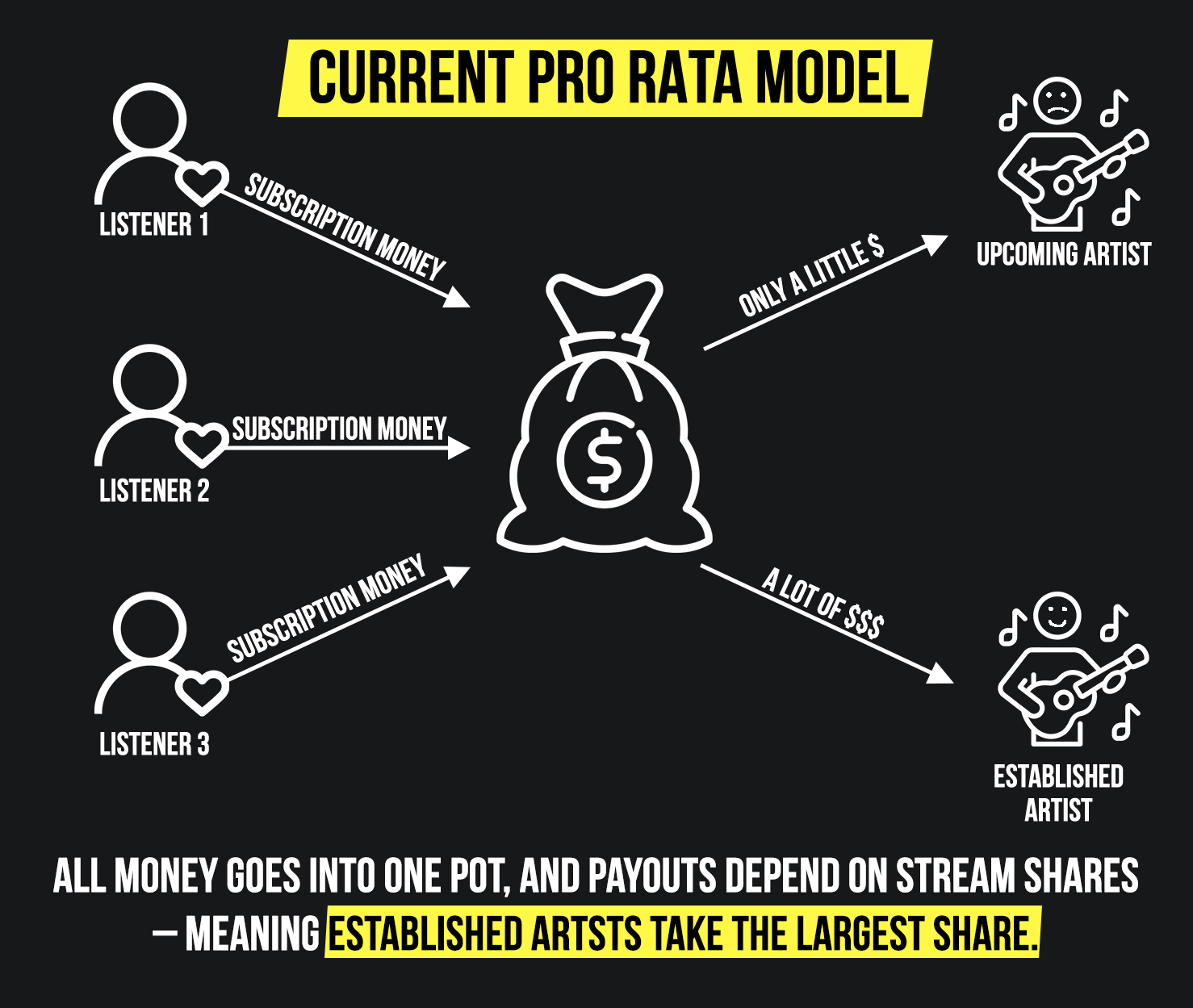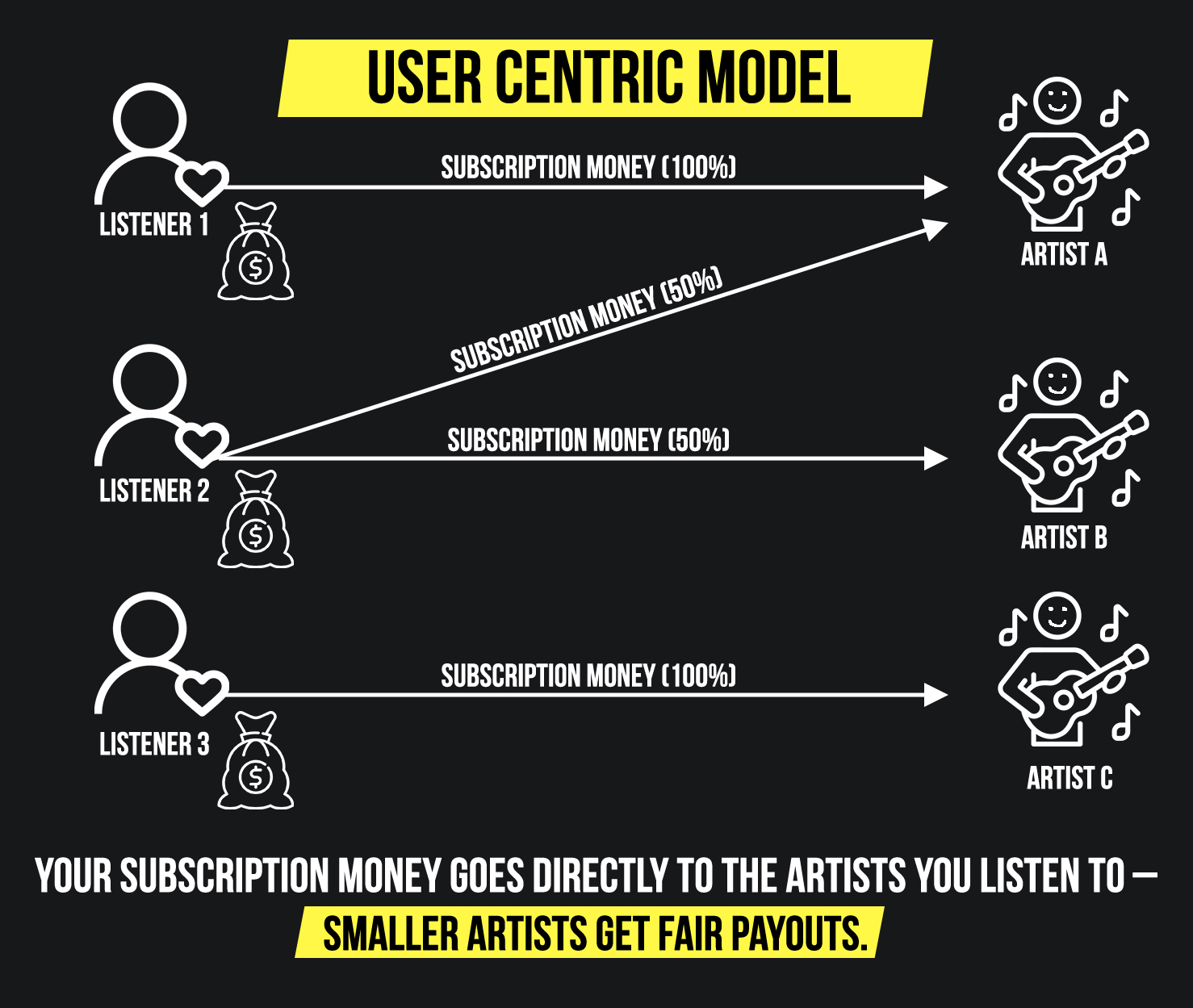Fairness in
Music Industry
For a fair share of streaming income.
For more control & influence of artists.
Who Really Gets Your Streaming Money?
Did you know that many artists are losing money because of how streaming payouts work? Under the current pro rata model, your subscription money often doesn’t go to the artists you actually listen to — but instead gets pooled and distributed to the most-streamed artists overall.

This system is unfair, especially for independent and niche musicians who have loyal fans but get overlooked by the algorithm.
We call for …
a shift to a user-centric model where your money supports the artists you stream – It’s fairer.

Lack of transparency
Why Are Artists Left Out of the Conversation?
Too often, the people making the music have no idea what’s happening behind closed doors. Deals between streaming platforms and rights holders are negotiated without including the artists — the very people those deals affect most.
This lack of transparency keeps artists in the dark about how much they earn and why. It’s time to change that.
We call for …
a seat at the table – artists must be included in deal negotiations and decision-making processes — with full access to the terms that determine their livelihoods.
Fake Streams & Manipulation
Fake Streams, Fake Artists — Real Damage
The streaming system is being manipulated — not just by fake streams, but also by fake artists. These artificially boosted plays and made-up personas distort charts, drain royalties, and push honest, hardworking musicians out of the spotlight.
It’s a rigged game — and it’s time to fix it.
We call for …
real safeguards to protect the music economy from fraud and manipulation. Platforms must ensure that only real artists and real fans shape the future of music.
What We Do
We maintain an ongoing dialogue across the entire music ecosystem: with the BVMI, major labels such as Warner Music, Universal and Sony, independent distributors like Zebralution and Believe, as well as indie labels.
We are in regular exchange with nearly all DSPs — including Spotify, Apple Music, Deezer and others.
Our network extends to cultural institutions (D-Popkultur, IMUC, EMMA UK), thought leaders like Dieter Gorny, and engaged artists such as Balbina. We also connect with policymakers, for example in discussions with Hamburg’s Minister of Culture, Carsten Brosda, at the Reeperbahnfestival.
Together with our partners, we bring in research, studies, and insights from universities and experts to strengthen the debate.
Support us:
A Matter of Course
The initiative is committed to respectful interaction with all partners, colleagues, and negotiating parties. We take particular care to ensure that no one is discriminated against on the basis of gender, origin, musical genre, ethnicity, skin color, disability, religion, or sexual orientation. Fair Share will categorically deny participation or any form of cooperation to individuals who do not act in accordance with the principles of our democracy and the German Basic Law, or who spread contempt for humanity, hatred, agitation, or conspiracy theories.
Industry supporters:
Cyrus Alamouti (Davin Enterprises), Henrik Anders, Juri Bader (Beatbude), Daniel Baron, Björn Bäurle, Sidney Bieri, Sören Bindemann, Blichmann (Haargalerie Blichmann), Matthias Böttcher, Stefan Bosch (Stefan Kriesme Übersetzungen und Bürotätigkeiten), Benjamin Branzko, Benjamin Budde (Budde Music Management GmbH), Majon Burger, Sven Bünger, Camille (Camille Nanto Dance), Nigel Carling (NGGT), Jan Clausen, Johannes Cordes (JC Entertainment UG), Yasmin Daus (KSK Media GmbH/Social Media), Garry Mark Davison (Scoopas GmbH), Jonas Diestelmeier (klainLaut audio), Maximilian Dorgerloh (Drummer), DolceRita Music & Publishing GmbH, Thomas Ebner (Ebydrums), Emiel van Egdom, Hendrik Fauer, Marc Feldmann (Marcsfirma), Albrecht Fiebiger, Hanno Fierdag, Florian Fischer, Lena Förg, Oliver Funke (Machine Ethics), Jo Garvey, Beat Gottwald, Florian Graser, Paul Grauwinkel, Clive Grimble (Splittin’Image), Robin Grubert, Hanno Heekeren, Christopher Hellwig, Sophie-Justine Herr, Jens Herrndorff (Musikmanagement Jens Herrndorff), Iris Hofmann, Claudia Kaloff, Sophie Kammann, Uwe Kanthak, Alexander Kaufmann, Stefan Kelm, Daniel Kempf (OWTF Entertainment), Armin Kerscher, Andreas König, Jana Maria Knopp, Dirk Krieter, Sylvia Kollek (Marken Medien Musik), Katharina Köhler, Jörn Kretschmer, Julia Kravcikova, Tina Krug, Sascha Kulasevic (Vorarlberger Volleyball Verband), Doris Kulossa-Delfino (Label recordarpa – Blockflötenbau), Diana Leitmann, Michelle Leonard, Christina Lux (LUX), Verena Mack, Marlen (Bonsai Kitten), Daniel Maurer, Alexander Maurus/Thomas Wolf (Wanderlust Entertainment), Patrik Majer, Kai Manke (Networking Media), Lisa Mckeown, Mona Meiller, Olaf Meinking, Christian Mikolai, Steffen Möller (BArch), Florian Müller, Jürgen Müller, Susanne Neeb, Alexander Neuparth (K.E.R.N.), Britta Ostermann, Nicolas Pasquet (Dirigent), T.M. Peters, Piazza Media GmbH, Mark Reeder (Mark Reeder MFS), Johannes Ribic, Christian Roloff (Spreeklang DJs), Manfred Rolef, ROYALIST, Isabelle Saadatnejad (Hush Hush), Rocko Schamoni, Anna Seifert, Uwe Scheier (ZOS Studio und TV), Arndt Schmöle, Lui Schröder, Schuldt-Ertel, Axel Schulz, Tessy Schulz (TESSYSCHULZ – International Artist Management + Music Consultancy), Peter Schulz, Josef Schweinzer (MacGyzer), Dieter Semmelmann (Semmel Concerts), Richard Simon Schweinzer (Hoedn Productions), Uwe Scheier (ZOS Studio und TV), Kai Steltner, Bernd Steinbach, Patrick von Strenge, Chantal Stockmann (Kanzlei Stockmann), Dr. Angelika Strittmatter, Sebastian Bohnenberger, Simon Thiel (Simon&Thiel), Siegfried Traub (SGT Musican live & teach), Tobijan Torrentino (Jevatta), Klaus Unmüßig, Björn Urbanek, Hans-Peter Vogel, Verlaashi, Sven von Strauch (Future Mind), Johannes Weiß, Thorsten Wulfes (Thorsten Wulfes Consulting), Martin Wulf (Almost Frank), Jan-Simon Wolff, Andreas Wolff (Music Paradise Tonstudio), Rita Zarwel, Horst Zaunegger, THE BRIDGE International Artist Services GbR

